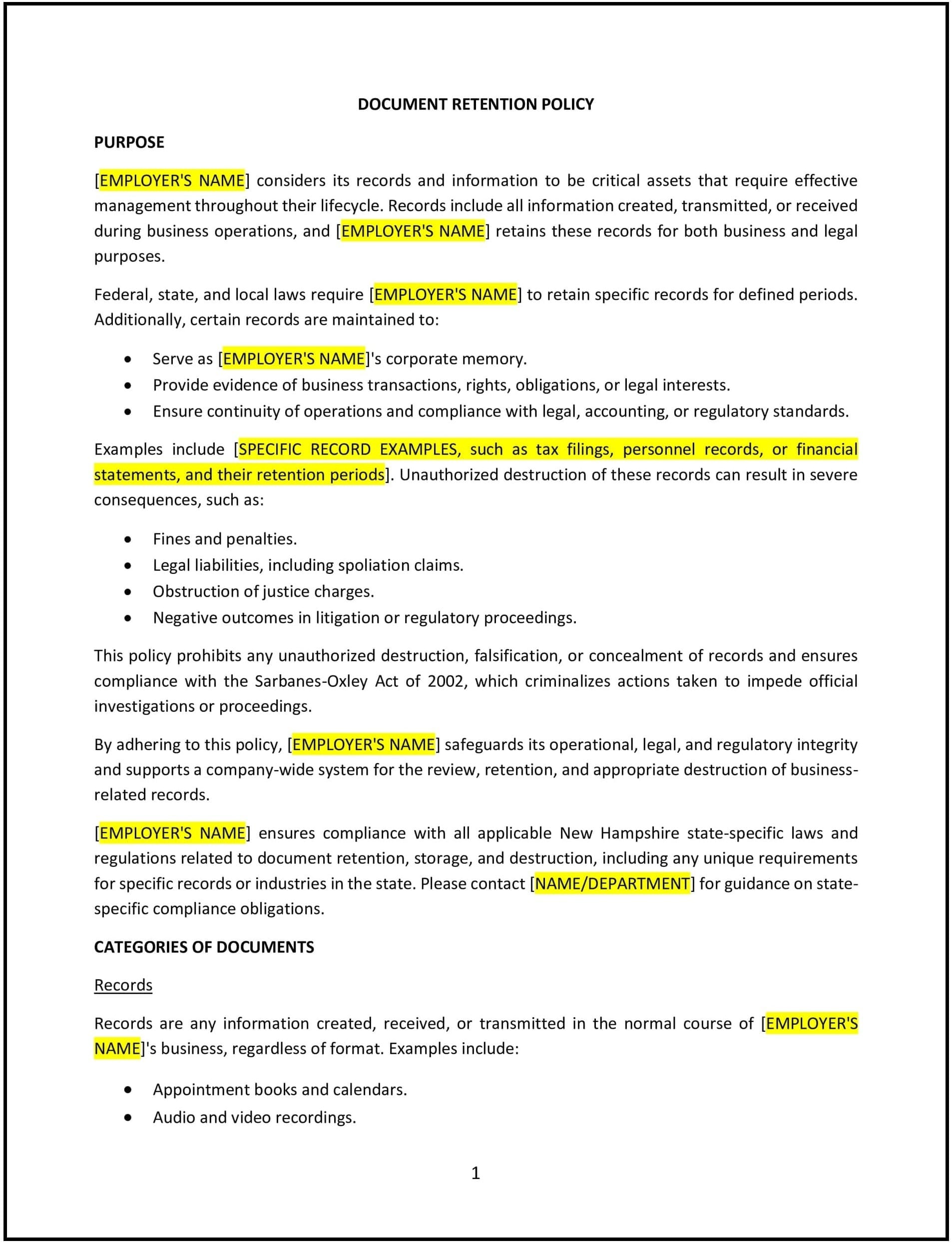Document retention policy (New Hampshire): Free template
Got contracts to review? While you're here for policies, let Cobrief make contract review effortless—start your free review now.

Customize this template for free
Document retention policy (New Hampshire)
A document retention policy helps New Hampshire businesses manage their records by specifying how long different types of documents should be retained, when they should be disposed of, and the procedures for securely managing those documents. This policy applies to both physical and digital documents, ensuring that the business retains essential records while reducing clutter and mitigating legal or regulatory risks associated with improper document disposal.
By implementing this policy, businesses in New Hampshire can improve their document management, enhance operational efficiency, and ensure they meet legal and regulatory requirements for record retention.
How to use this document retention policy (New Hampshire)
- Define document categories: List the types of documents that need to be retained, such as financial records, employee files, contracts, tax documents, and corporate records.
- Set retention timelines: Specify how long each category of document should be kept based on New Hampshire state law, industry standards, or regulatory requirements. Include retention periods for both physical and electronic records.
- Establish procedures for document disposal: Define how documents should be securely disposed of once they are no longer required, including shredding paper records or securely deleting electronic files.
- Ensure secure storage: Outline how sensitive documents should be stored to prevent unauthorized access, including physical security measures (e.g., locked filing cabinets) and electronic security measures (e.g., encryption and password protection).
- Address employee responsibilities: Clarify the responsibilities of employees in managing documents, including identifying records for retention or disposal, maintaining proper organization, and following the company’s retention schedule.
- Implement auditing and monitoring: Set up regular audits to ensure compliance with the retention schedule and to identify any outdated or improperly disposed documents.
- Review and update: Regularly review the policy to reflect changes in New Hampshire state laws, business operations, or industry standards, and update retention periods accordingly.
Benefits of using this document retention policy (New Hampshire)
This policy provides several benefits for New Hampshire businesses:
- Reduces legal and financial risks: By following proper document retention guidelines, businesses reduce the risk of facing legal consequences for improper record management or failure to retain important documents.
- Enhances operational efficiency: A clear policy helps streamline document management by specifying when documents should be kept and when they can be disposed of, improving organization and reducing clutter.
- Improves compliance with regulations: Having a defined retention schedule helps businesses stay compliant with New Hampshire state laws and federal regulations regarding record-keeping for tax, legal, and regulatory purposes.
- Protects sensitive information: Securely storing and disposing of documents ensures that sensitive or confidential business information is protected from unauthorized access or exposure.
- Supports business continuity: A well-organized document retention system ensures that critical business records are preserved for future reference, especially in cases of audits, legal disputes, or business operations.
Tips for using this document retention policy (New Hampshire)
- Communicate the policy clearly: Ensure that all employees are aware of the document retention policy, understand the types of documents they are responsible for, and know the retention periods for each.
- Implement technology solutions: Use document management systems to help track and organize documents, making it easier to adhere to retention schedules and ensure secure storage and disposal.
- Be consistent: Regularly follow the retention schedule and dispose of documents on time to maintain organization and avoid keeping unnecessary files.
- Provide training: Offer training on how to manage documents, including identifying which documents to keep and how to store or dispose of them securely.
- Review the policy regularly: Update the policy annually or whenever there are changes in New Hampshire state laws or industry regulations to ensure it remains effective and up-to-date.